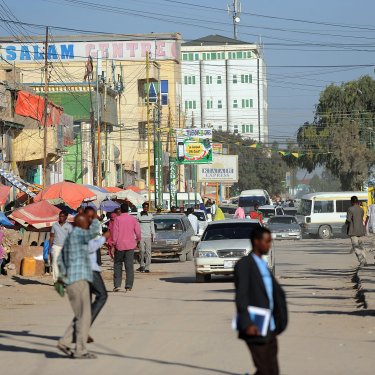Three journalists facing possible jail terms in Somaliland trials

Newspaper journalists Muuse Jambiir of Ogaal and Cabdirashiid Nuur Wacays and Siciid Khadar Cabdilaahi of Husbad were told that their trials had been postponed when they went to the Hargeisa regional court on 23 April. Officials said the judge was in mourning and the prosecutor was unable to attend for health reasons. The journalists, who are accused of publishing false news, have not yet been given a new date for the start of the trials.
***********************************************************************
Reporters Without Borders is concerned about the possible prison sentences that three journalists are facing in two separate cases in Somaliland and urges the judicial authorities to respect this autonomous region’s constitution and press law, which guarantee freedom of information.
A court in Hargeisa, Somaliland’s capital, is due to hear the two cases tomorrow. One concerns Muuse Jaambiir, the chairman of the newspaper Ogaal, who is charged in connection with articles in August 2015 about the way Somaliland’s president and his family handled the privatization of a government-owned company. He is accused of publishing false news “defaming the president and shaming the first lady.”
The other concerns Cabdirashiid Nuur Wacays, the chaiman of the newspaper Husbad, and Siciid Khadar Cabdilaahi, its editor-in-chief, who are accused of “false publication and running an unlicensed newspaper.” According to the Somaliland Human Rights Centre, the second charge is particularly absurd because the two journalists were in the process completing the licensing formalities when they were arrested on 30 November. They were released on bail four days later but Husbad was suspended and has not reappeared since then.
The Somaliland authorities recently adopted a tougher line with the media, suspending two other local newspapers, Codka Shacabka and Xog Ogaal, in March. Haatuf, a newspaper that covered corruption cases allegedly involving Somaliland government officials, has meanwhile been banned since April 2014.
“Journalists must be free to do their job of reporting the news,” said Constance Desloire of RSF’s Africa desk. “We urge the Hargeisa judicial system to respect article 32 of the constitution and articles 3 and 10 of the press law, which guarantee the media’s right to inform the public without hindrance.”
Somaliland proclaimed its independence from Somalia in 1991 and, although not recognized by the international community, has its own government and constitution. In the course of its 25-year campaign for international recognition, Somaliland has pointed out that it respects the rules of democracy much better than the rest of Somalia. But journalists are often threatened and are exposed to dangers and to arbitrary behaviour by the authorities. The journalist Mohamed Omar Jaray has been detained in Borama, 120 km west of Hargeisa, since 13 April for interviewing residents who chose to sing Somalia’s national anthem instead of Somaliland’s.



